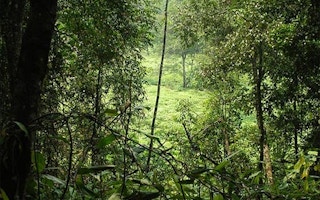Every so often, someone asks about the trade-offs that emerging nations must make: Should they save the rainforest or promote economic development?
Why anyone assumes this is an “either-or” choice is mind boggling. We must do both.
Modern forestry policies in the world’s emerging nations are based on the historic practices of colonial plantations – but updated to correct mistakes of the past.
Consider Indonesia. For nearly 300 years, Dutch and other trading companies carved up millions of hectares of Indonesian rainforest for plantations to grow rubber, coffee, sugarcane, coconut, nutmeg, tobacco, palm oil seeds, teak and other crops. They slashed and burned the rainforest to open land for cultivation. Today, those practices are illegal.
Governments like that of Indonesia embrace scientific standards for plantation conversion and impose strict regulations on companies doing the converting according to relevant best practices. For example, Indonesian forest policy protects high-value rainforest and critical peatland. As a result, plantations can legally be located only on land that the government defines as “degraded,” such as logged-over non primary non high-value forests and “denuded,” such as tracts of forest that had previously been slashed and burned for unsustainable farming.
The result of these policies is that literally more than half of Indonesia’s land mass remains tree-covered – making the Indonesian rainforest one of the world’s largest tracts of natural preserves in the world.
Balance improves quality of life
Smart policy does more than protect trees. It helps people.
About 42 percent of Indonesians work in agriculture, and government policies that promote sustainable development have significantly helped to improve the lives of typical citizens. Consider just a few indicators: life expectancy at birth has risen from 37.5 years in 1950 to 71.05 in 2010. Literacy has risen from 67.3 percent in 1980 to 92 percent in 2006. Poverty has declined from 60 percent in 1970 to 13.3 percent today.
Emerging nations recognise that their natural resources can help to fuel economic growth. They follow a model developed countries have employed for centuries, tapping their own – or their colonies’ – natural resources to improve people’s quality of life.
But smart policy like the one followed by Indonesia, for example, improves quality of life while minimising the risks to natural treasures like the rainforest. And this “precautionary approach” has allowed Indonesia to be self-reliant. The careful regulation of strong natural resource-based industries has helped Indonesia improve its gross domestic product while reducing its external debt.
Obviously, Indonesia still confronts significant problems. More than 30 million people still live below the poverty line, for example. That is one reason why you can see smoke billowing from forest lands where rogue smallholders slash and burn tracts for personal and community farming and agricultural needs. Government regulations ban such vandalism, but enforcing the law is difficult when resources are limited and the closest road is a day’s hike from the burning field.
In these cases, the government of Indonesia relies on forestry and other companies who operate close to the burn site to be partners in the fight to preserve the forests. The government knows it can count on support from private industry because those of us in emerging nations recognize that we will make greater progress – whether in economic development or environmental protection – by working together. We know this from experience.
Commitment to sustainability is real
Some critics like to say that Indonesia and other emerging countries are too corrupt or too weak-willed to truly protect the environment, but the evidence is clear that emerging nations are at least as committed to real preservation as more developed countries.
The recent partnership between Indonesia and Norway, Reducing Emissions from Deforestation and Forest Degradation (known as REDD) that is designed to reduce emissions from deforestation and degradation of forest and peatlands, is truly historic. For the first time, two countries are working together to find a workable solution to the twin issues of fighting climate change and reducing poverty in the developing world.
In 2011, the first stage of the Norway-Indonesia partnership will be implemented: a two-year suspension of new concessions for conversion into plantations. This period – the “moratorium” – has received a great deal of attention worldwide. What is less well known is that it is just the first step in a long-term plan to create a viable economic model for REDD.
This means Indonesia is blazing a trail for other nations by helping to define a viable financial solution to the issue of preserving the environment and reducing greenhouse gases.
My own company, Asia Pulp & Paper Group (APP), supports the moratorium policy because we see it as the logical next step on a long journey towards our goal of becoming the world’s most sustainable producer of pulp and paper products.
We are creating a roadmap for sustainable forest management and paper manufacturing to take APP to 2020 and beyond. By the end of 2015, we will source 100 percent of our pulpwood supply from sustainable plantation stock and require our suppliers to meet Indonesia’s mandatory sustainable forest management standards. By the end of 2020, we will require all our exclusive pulpwood suppliers to have comprehensive and voluntary LEI (Indonesia Ecolabelling Institute) certification.
There is much to do, but we are proud of our achievements so far. APP’s pulpwood suppliers manage 2.5 million hectares of gross land, just 1.3 per cent of the landmass of Indonesia. Of this area, our suppliers have set aside 40 percent of the land – around 1 million hectares – for conservation, rehabilitation and community use.
And we are especially proud of the work we are doing in partnership with government, communities and non-governmental organizations because these joint efforts are making an immediate difference in the lives of people and the protection of our environment. We are helping to save endangered tigers through the Senepis Sumatran Tiger Sanctuary and protecting peat land through support for the vast Giam Siak Kecil – Bukit Batu Biosphere Reserve and the Kampar Carbon Reserve, the world’s first privately funded project turning pulpwood plantation concessions into a carbon reserve to protect deep-peat carbon deposits and the biodiversity above it (REDD).
These initiatives and the others we support deliver more than the promise of improvement, preservation and economic development. They make these things a reality in the lives of Indonesians – without forcing a false choice between economic opportunity and environmental protection.
Aida Greenbury is managing director of sustainability & stakeholder relations at Asia Pulp & Paper (APP)


















